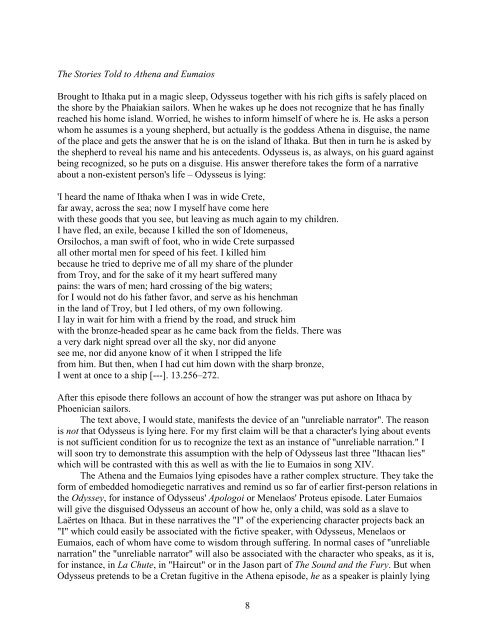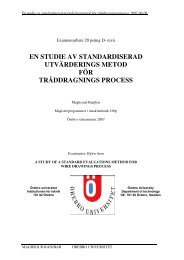Stories in Disguise: On Odysseus' Ithacan Lies and Their Relevance ...
Stories in Disguise: On Odysseus' Ithacan Lies and Their Relevance ...
Stories in Disguise: On Odysseus' Ithacan Lies and Their Relevance ...
Create successful ePaper yourself
Turn your PDF publications into a flip-book with our unique Google optimized e-Paper software.
The <strong>Stories</strong> Told to Athena <strong>and</strong> Eumaios<br />
Brought to Ithaka put <strong>in</strong> a magic sleep, Odysseus together with his rich gifts is safely placed on<br />
the shore by the Phaiakian sailors. When he wakes up he does not recognize that he has f<strong>in</strong>ally<br />
reached his home isl<strong>and</strong>. Worried, he wishes to <strong>in</strong>form himself of where he is. He asks a person<br />
whom he assumes is a young shepherd, but actually is the goddess Athena <strong>in</strong> disguise, the name<br />
of the place <strong>and</strong> gets the answer that he is on the isl<strong>and</strong> of Ithaka. But then <strong>in</strong> turn he is asked by<br />
the shepherd to reveal his name <strong>and</strong> his antecedents. Odysseus is, as always, on his guard aga<strong>in</strong>st<br />
be<strong>in</strong>g recognized, so he puts on a disguise. His answer therefore takes the form of a narrative<br />
about a non-existent person's life – Odysseus is ly<strong>in</strong>g:<br />
'I heard the name of Ithaka when I was <strong>in</strong> wide Crete,<br />
far away, across the sea; now I myself have come here<br />
with these goods that you see, but leav<strong>in</strong>g as much aga<strong>in</strong> to my children.<br />
I have fled, an exile, because I killed the son of Idomeneus,<br />
Orsilochos, a man swift of foot, who <strong>in</strong> wide Crete surpassed<br />
all other mortal men for speed of his feet. I killed him<br />
because he tried to deprive me of all my share of the plunder<br />
from Troy, <strong>and</strong> for the sake of it my heart suffered many<br />
pa<strong>in</strong>s: the wars of men; hard cross<strong>in</strong>g of the big waters;<br />
for I would not do his father favor, <strong>and</strong> serve as his henchman<br />
<strong>in</strong> the l<strong>and</strong> of Troy, but I led others, of my own follow<strong>in</strong>g.<br />
I lay <strong>in</strong> wait for him with a friend by the road, <strong>and</strong> struck him<br />
with the bronze-headed spear as he came back from the fields. There was<br />
a very dark night spread over all the sky, nor did anyone<br />
see me, nor did anyone know of it when I stripped the life<br />
from him. But then, when I had cut him down with the sharp bronze,<br />
I went at once to a ship [---]. 13.256–272.<br />
After this episode there follows an account of how the stranger was put ashore on Ithaca by<br />
Phoenician sailors.<br />
The text above, I would state, manifests the device of an "unreliable narrator". The reason<br />
is not that Odysseus is ly<strong>in</strong>g here. For my first claim will be that a character's ly<strong>in</strong>g about events<br />
is not sufficient condition for us to recognize the text as an <strong>in</strong>stance of "unreliable narration." I<br />
will soon try to demonstrate this assumption with the help of Odysseus last three "<strong>Ithacan</strong> lies"<br />
which will be contrasted with this as well as with the lie to Eumaios <strong>in</strong> song XIV.<br />
The Athena <strong>and</strong> the Eumaios ly<strong>in</strong>g episodes have a rather complex structure. They take the<br />
form of embedded homodiegetic narratives <strong>and</strong> rem<strong>in</strong>d us so far of earlier first-person relations <strong>in</strong><br />
the Odyssey, for <strong>in</strong>stance of <strong>Odysseus'</strong> Apologoi or Menelaos' Proteus episode. Later Eumaios<br />
will give the disguised Odysseus an account of how he, only a child, was sold as a slave to<br />
Laërtes on Ithaca. But <strong>in</strong> these narratives the "I" of the experienc<strong>in</strong>g character projects back an<br />
"I" which could easily be associated with the fictive speaker, with Odysseus, Menelaos or<br />
Eumaios, each of whom have come to wisdom through suffer<strong>in</strong>g. In normal cases of "unreliable<br />
narration" the "unreliable narrator" will also be associated with the character who speaks, as it is,<br />
for <strong>in</strong>stance, <strong>in</strong> La Chute, <strong>in</strong> "Haircut" or <strong>in</strong> the Jason part of The Sound <strong>and</strong> the Fury. But when<br />
Odysseus pretends to be a Cretan fugitive <strong>in</strong> the Athena episode, he as a speaker is pla<strong>in</strong>ly ly<strong>in</strong>g<br />
8

















